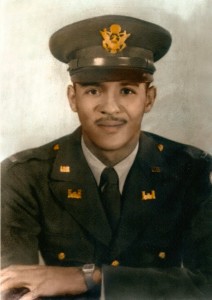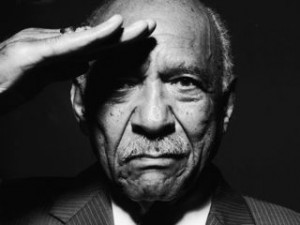This morning I woke having dreamt about my father. I guess I had been thinking about him as Memorial Day approached, and of course there’s the matter that I have two photographs of him staring at me from the bookshelf in my bedroom. One is of him as a young man (early 20s) in the uniform of a second lieutenant in the United States army, and the other as a much older man (early 80s) looking into the camera and saluting. The bookshelf sits right across the room from my bed, no more than ten feet from me. Many days I salute him back, a silent acknowledgment that, even when things are difficult, Chamblees soldier on.
This morning’s dream was about honoring those who had served in the military during war time, and those who had fallen. My father didn’t fall during the war (otherwise I wouldn’t be here writing this) but he did serve honorably in World War II. He was awarded a Purple Heart for injuries suffered in an explosion at Normandy (he was an engineer helping to detonate land mines after the initial invasion.) He was just 22 years old–younger than my son is now–when he fought and was injured serving his country. He was hurt in 1944 but didn’t receive the decoration until nearly two years later when he returned from England. He would come home to a country where many of his fellow Americans still considered him a second-class citizen. And although he had been raised in Chicago, he returned to the segregated south to finish college and go to medical school in Nashville, Tennessee. How challenging that must have been for him: to have seen and experienced the terrors of war only to come “home” to a place that didn’t really welcome him. My father’s military service might have ended in 1946, but he was a soldier his whole life. Most of it he spent fighting against racial and social injustice, as well as serving as a physician/healer and public servant.
I am grateful to my father for many things, but mostly for the example he set in the way he served the community. As the fifth of his six children I have to say that I didn’t know my father very well. He was so active in the civil rights movement when I was a child, as well as doctoring hundreds of patients in over 55 years of service as a family practice physician that he wasn’t around much. Simply put, he was too busy giving of his time as a man of the community that he didn’t really have as much time to spend with his family as he perhaps might have liked. I didn’t always understand that, and at times I resented the nameless “community” that demanded so much of my father’s attention. But in spite of those bouts of resentment, I also learned about the importance of service and giving oneself to causes you believe in.
I never served in the military; I never even considered it, and I doubt my father would have thought it a particularly good idea. He and my mother strongly encouraged each of their children to pursue higher education. My brother closest to me in age is the only one of the six of us to follow in Dad’s footsteps and become a soldier; Alan joined the Marines. In the few short years he served, he showed exemplary discipline and dedication, finishing at the top of his basic training class and ultimately achieving the rank of Sergeant. I am proud of him and his service to the country, and am grateful that he was never called upon to fight in a war. Like my father, he has carried the discipline and lessons learned during his military service into other areas of his life. He too has been an example to me of what it means to “soldier on.”
I am not a big believer in war, in fact I have major issues with most of the wars (or so-called “conflicts”) the U.S. engaged in in various places around the world over my lifetime (Viet Nam, the first Gulf War, Iraq and Afghanistan and other military actions.) But I do honor the men and women who offer their lives in service to the country through the military. I honor their service, as well as the sacrifices made by their parents, spouses and partners, and children who watch them go and pray for their safe return. I am grateful for the legacy of soldiers like my father, veterans like my brother, and this current generation of young men and women. To all of you, I salute.


